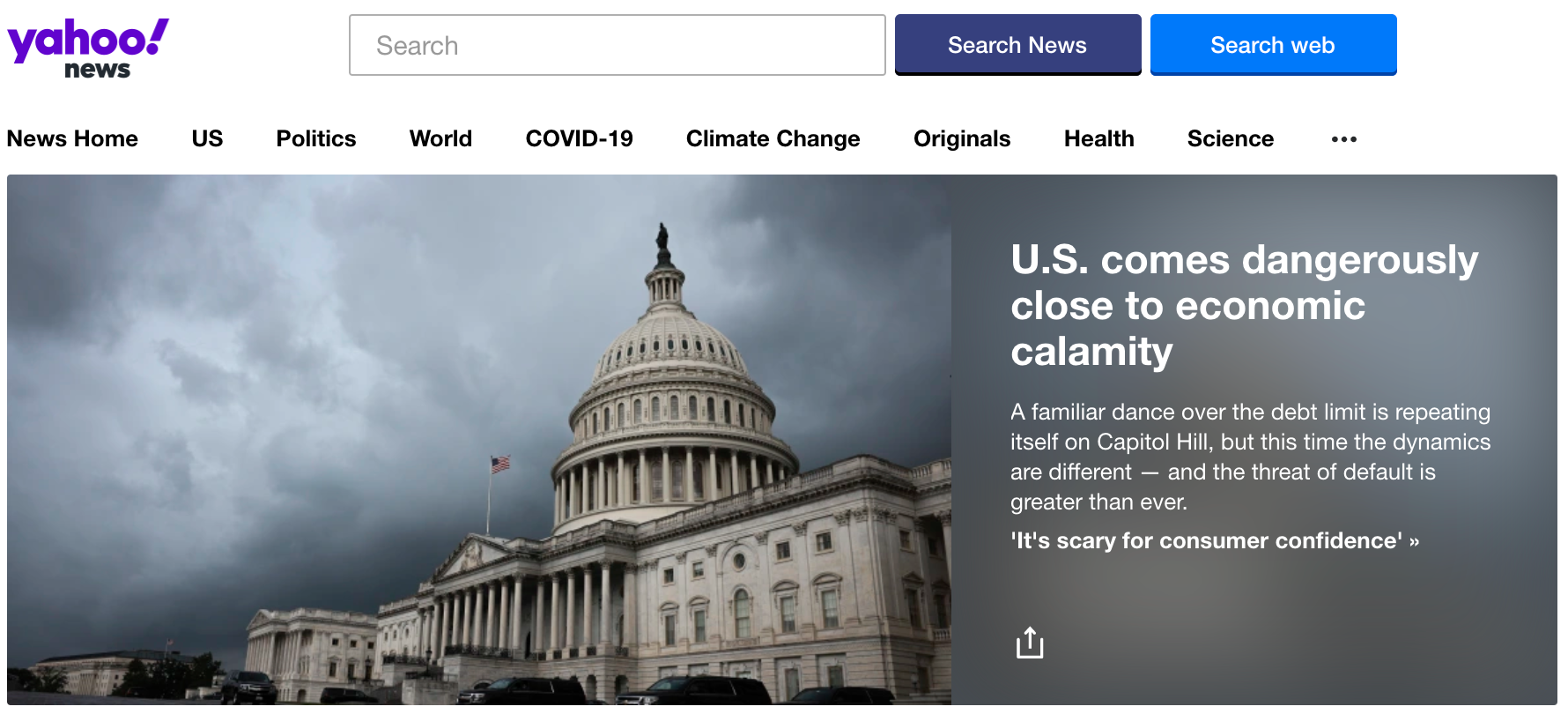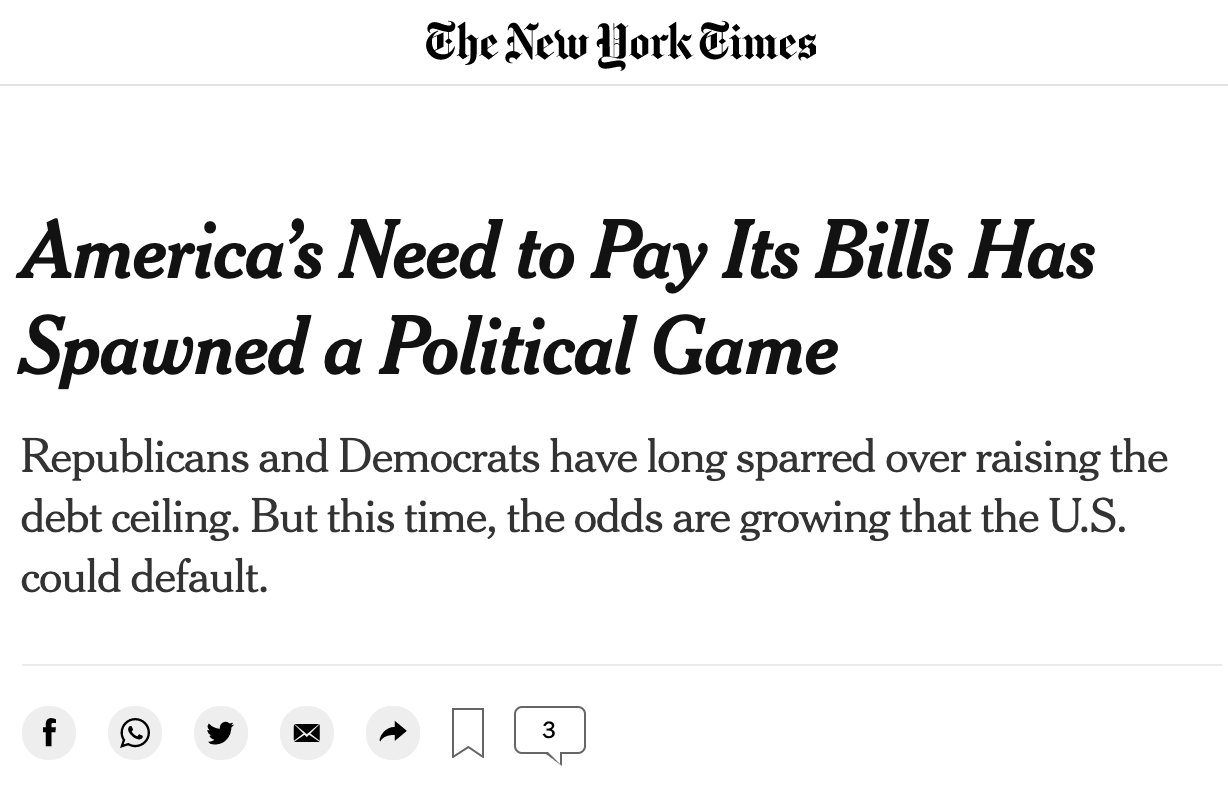Yahoo! News published this as the headline:
The Times itself has sterilized it:
But they are predicting hell being unleashed.
Or rather, they’re admitting it.
It’s not really a matter of “predictions,” but simply a matter of time before the big thing happens.
It’s not as accurate, meaningful, interesting, or entertaining as my own material on the topic, but let’s take a peek at what they’re saying.
For nearly two decades, lawmakers in Washington have waged an escalating display of brinkmanship over the federal government’s ability to borrow money to pay its bills. They have forced administrations of both parties to take evasive actions, pushing the nation dangerously close to economic calamity. But they have never actually tipped the United States into default.
The dance is repeating this fall, but this time the dynamics are different — and the threat of default is greater than ever.
Republicans in Congress have refused to help raise the nation’s debt limit, even though the need to borrow stems from the bipartisan practice of running large budget deficits. Republicans agree the United States must pay its bills, but on Monday they are expected to block a measure in the Senate that would enable the government to do so. Democrats, insistent that Republicans help pay for past decisions to boost spending and cut taxes, have so far refused to use a special process to raise the limit on their own.
Observers inside and outside Washington are worried neither side will budge in time, roiling financial markets and capsizing the economy’s nascent recovery from the pandemic downturn.
If the limit is not raised or suspended, officials at the Treasury Department warn, the government will soon exhaust its ability to borrow money, forcing officials to choose between missing payments on military salaries, Social Security benefits and the interest it owes to investors who have financed America’s spending spree.
Yet Republicans have threatened to filibuster any attempt by Senate Democrats to pass a simple bill to increase borrowing. Party leaders like Sen. Mitch McConnell of Kentucky want to force Democrats to raise the limit on their own, through a fast-track congressional process that bypasses a Republican filibuster. That could take weeks to come to fruition, raising the stakes every day that Democratic leaders decline to pursue that option.
The problem is further compounded by the fact that no one is quite sure when the government will run out of money. The COVID-19 pandemic continues to ravage the United States in waves, frequently disrupting economic activity and the taxes the government collects, complicating Treasury’s ability to gauge its cash flow. Estimates for what is known as the “X-date” range from as early as Oct. 15 to mid-November.
Yeah, the virus did it.
The virus overrode the government’s ability to make decisions.
There was no possible response to a virus than to completely collapse the economy, because otherwise, someone could die.
And the entire global economy is of lesser value than one person’s life, despite the fact that literally hundreds of millions of people are going to die as a result of this plan to save “even one life.”
Amid that uncertainty, congressional leaders and President Joe Biden are not even attempting to negotiate a resolution. Instead, they are sparring over who should be saddled with a vote that could be used against them, raising the odds that partisan stubbornness will propel the country into a fiscal unknown.
It all adds up to an impasse rooted in political messaging, midterm campaign advertising and a desire by Republican leaders to do whatever they can to protest Biden’s economic agenda, including the $3.5 trillion spending bill that Democrats hope to pass along party lines using a fast-track budget process.
Republicans say they will not supply any votes to lift the debt cap, despite having run up trillions in new debt to pay for the 2017 tax cuts, additional government spending and pandemic aid during the Trump administration. Democrats, in contrast, helped President Donald Trump increase borrowing in 2017 and 2019.
The Times is obviously a cartoonishly partisan paper, but it is mostly true that Republicans are no more “fiscally conservative” than Democrats, as a general rule.
I mean, Democrats are a lot worse, but the Republicans are so bad that it is a pointless competition.
But saying that “tax cuts cost the government money” is an ideological position which has been proved factually wrong – especially given that both parties support outsourcing American jobs to countries with lower taxes.
“If they want to tax, borrow, and spend historic sums of money without our input,” McConnell said on the Senate floor this week, “they will have to raise the debt limit without our help.”
Thus far, Biden and Democratic leaders in Congress have declined to do so, even though employing that process would end the threat of default.
Jon Lieber, a former aide to McConnell who is now with the Eurasia Group, a political-risk consultancy in Washington, wrote in a warning to clients this week that there is a 1-in-5 chance the standoff will push the country into at least a technical debt default — forcing the government to choose between paying bondholders and honoring all its spending commitments — this fall.
The article goes on to just keep blaming Republicans.
It’s dumb.
But here’s a protip you can take to the bank: they’re not going to default. At least not in this way.
They are going to default through inflation.
They are going to make sure that they pay their obligations with new money.
Then, due to inflation, the dollar will become nonviable, and they will introduce their token system, where you get credits on your phone every week (assuming you’re all vaxed up and not making racist statements on the internet).
This was the plan from the beginning, and the coronavirus hoax was really just an excuse to deal with this debt system that was not plausibly sustainable any longer.
The problem here is what that will mean globally, and I frankly have no idea. Obviously, Russia, China and the rest of the free world is going to have to come up with some other solution, probably with China establishing a new digital reserve currency.
But why would America want to allow that? And what can they do to prevent it?
No idea.
 Daily Stormer The Most Censored Publication in History
Daily Stormer The Most Censored Publication in History





